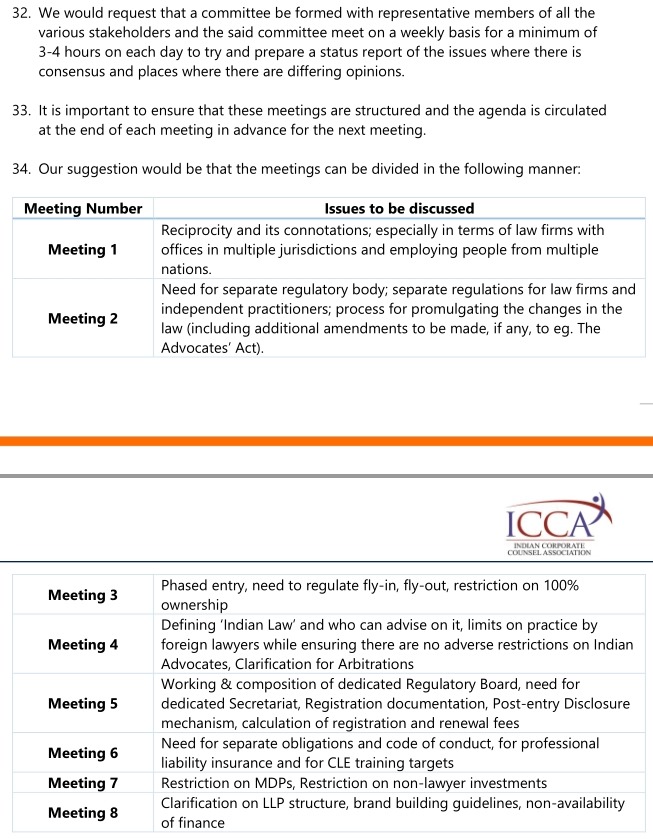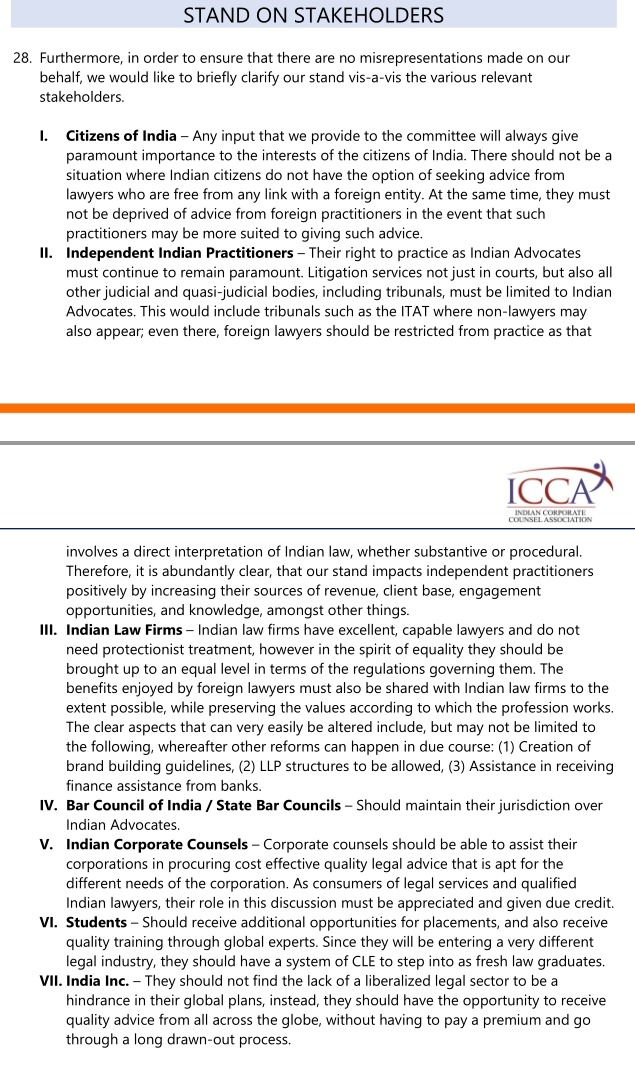The Indian Corporate Counsels Association (ICCA) has proposed eight weekly meetings between various stakeholders in the legal services liberalisation discussion, in order to prepare a status report on the points of consensus and disagreement between them.
ICCA made a strong case for continuing the liberalisation talks, despite the Bar Council of India (BCI) having cancelled its involvement, and has circulated its letter to all state bar councils, the BCI, relevant ministries, law school vice chancellors, Assocham, FICCI, the Society of Indian Law Firms (Silf), the Indian National Bar Association (INBA) and others.
(Read full letter below or click here).
In its letter addressed to law secretary Suresh Chandra, dated 13 October, the ICCA has reiterated that it is an important stakeholder in the liberalisation discussion, and proposed that a committee should be formed with representatives of all stakeholders of the discussion.
This committee should convene weekly meetings, of 3-4 hours each, on the following themes, according to ICCA: Reciprocity, the regulator, phased entry, defining ‘Indian law’ and who can advise on it, regulatory board, professional liability insurance and continued legal education, restrictions on MDPs and non-lawyer investments, and other clarifications.

This letter also responded to the Bar Council of India’s (BCI) comment that the ICCA was “some unheard of organisation”, in the BCI’s 29 September letter through which it pulled out of the government’s liberalisation discussions. ICCA stated:
“ICCA and its consultant The RASICH Group represent the corporate counsels of India, who in turn advise both public and private sector companies - the largest group of clients that seek advice from lawyers. Accordingly, they are amongst the most important stakeholders in this discussion, due to their position as drivers of the legal economy and receivers of the legal services for which this entire discussion is taking place.”
The ICCA wrote that it has always had a threefold intent in its submissions: to promote progress of the Indian legal system, to protect domestic interests and to be fair and equitable to foreign lawyers.
It has also clarified its stand with respect to the seven stakeholders in the discussion – Indian citizens, independently practicing lawyers, law firms, the BCI and bar councils, Indian corporate counsels, students and corporate India:

Requesting the ministry to “kindly advise the BCI and the other stakeholders of a collaborative and meaningful approach towards these discussions”, the ICCA has made the following, among other, suggestions:
- Enact a separate legislation to govern foreign lawyers, instead of including them within the definition of “advocates” under the Advocates Act 1961
- Have a regulator for foreign lawyers, separate from the BCI, of which the BCI’s chairman would be an integral part. This regulator should have the involvement of the BCI and the state bar councils, even though this involvement is not imperative.
- The ICCA has identified 22 issues to be tackled: reciprocity, phased entry, restriction on practice of Indian law, restriction on 100 per cent ownership by foreign law firms of their Indian practices, process for promulgating the changes in the law, dedicated regulatory board, dedicated secretariat, regulating fly in and fly out, , separate regulations for foreign lawyers and law firms, registration documentation, post entry disclosure mechanism, registration and renewal fee, professional liability, no adverse restrictions on Indian advocates, restriction on multi-disciplinary practices, restriction on non-lawyer investments, clarification on LLP structure, advertising guidelines, promotion of continued legal education (CLE) and clarification for arbitrations.
- The ICCA has also clarified the status of each of the abovementioned issues in the BCI’s proposed draft amendment to the Advocates Act.
threads most popular
thread most upvoted
comment newest
first oldest
first
the silf and the bci is the top 1%. open your eyes. students will benefit. indian lawyers will have more sources of revenues. work will increase!
Kya kar rahein ho yaar? Baahar se bhi dikh raha hai ki everyone is letting themselves be steamrolled. jaago vakilon jaago!
If members of ICCA think they can take on the BCI and other organisations on legal market liberalisation then why not get this basic anomaly hurting their interests resolved first?
management consulting group. As non-lawyers leading non-lawyers, they have no business at the table. They are obviously bei the used by some interest or other.
Like it or not, BCI is the only essential party in this discussion who can legitimately represent lawyer's interests. If you attack BCI's legitimacy it strengthens the hands of non-lawyers to interfere with the profession. Please do not confuse the opinion one might have of BCI's current leadership with the necessity of protecting the independence of lawyers. BCI is not the spanner - it is the works. Or should be.
In this BCI infested world, I'd rather have the fly on the wall contribute rather than the BCI decide on our future. Have you even seen the BCI amendment proposals for the Advocates Act?
Bottomline is that these fellows are doing something that no lawyer had the guts to do. Stand up to the BCI.
On a lighter note, it could be a 'front' powered by Kian, since he is the only other person we know with the ****s to stick it to the BCI!
threads most popular
thread most upvoted
comment newest
first oldest
first